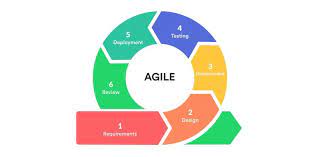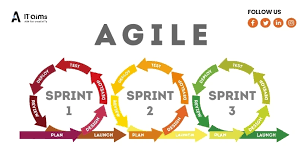The Power of Agile Development in Software Engineering
Agile development has revolutionized the way software is created and delivered in the modern era. This iterative approach to software development emphasizes flexibility, collaboration, and customer feedback throughout the development process.
One of the key principles of agile development is its focus on delivering working software in short, incremental cycles known as sprints. This allows for quick adaptation to changing requirements and ensures that the end product meets the needs of the customer.
Collaboration is at the heart of agile development. Cross-functional teams work closely together, sharing ideas and feedback to drive continuous improvement. By fostering a culture of open communication and transparency, agile teams are able to respond quickly to challenges and deliver value to their customers more effectively.
Another hallmark of agile development is its emphasis on customer feedback. By involving customers early and often in the development process, teams can ensure that they are building software that truly meets their needs. This customer-centric approach helps to reduce the risk of developing features that may not be valuable or necessary.
Overall, agile development offers numerous benefits to software engineering teams. It promotes adaptability, collaboration, and customer satisfaction, ultimately leading to higher-quality software products delivered more efficiently.
Understanding Agile Development: Key Principles, Benefits, and Collaborative Practices
- What is Agile development and how does it differ from traditional software development?
- What are the key principles of Agile methodology?
- How does Agile development promote collaboration within software development teams?
- What are the benefits of using Agile methodology in software engineering?
- How does Agile development handle changing requirements during the project lifecycle?
- What role does customer feedback play in Agile development?
What is Agile development and how does it differ from traditional software development?
Agile development is a modern approach to software development that emphasizes flexibility, collaboration, and iterative progress. Unlike traditional software development methodologies that follow a linear, sequential process, agile development breaks the project into smaller increments called sprints. These sprints allow for continuous feedback and adaptation, enabling teams to respond quickly to changes in requirements and deliver working software in a more incremental manner. The key difference lies in the adaptive nature of agile development, which prioritizes customer collaboration, frequent iterations, and the ability to adjust course based on feedback throughout the development cycle.
What are the key principles of Agile methodology?
The key principles of Agile methodology encompass iterative development, customer collaboration, responding to change, and fostering teamwork. Agile emphasizes delivering working software in short cycles, known as sprints, to adapt to evolving requirements. Customer involvement throughout the process ensures that the final product meets their needs effectively. Agile teams prioritize face-to-face communication and continuous feedback to address challenges promptly and improve product quality. By embracing these core principles, Agile methodology enables teams to be more flexible, responsive, and customer-focused in their software development approach.
How does Agile development promote collaboration within software development teams?
Agile development promotes collaboration within software development teams by fostering a culture of teamwork, communication, and shared responsibility. Through practices such as daily stand-up meetings, sprint planning sessions, and regular retrospectives, team members are encouraged to work together closely and share their progress, challenges, and ideas openly. By breaking down silos and encouraging cross-functional collaboration, agile teams are able to leverage the diverse skills and perspectives of their members to solve problems more effectively and deliver high-quality software that meets the needs of the customer. This emphasis on collaboration not only improves team dynamics but also leads to increased productivity, innovation, and overall project success in agile development environments.
What are the benefits of using Agile methodology in software engineering?
The benefits of using Agile methodology in software engineering are numerous and impactful. Agile promotes flexibility by allowing teams to adapt to changing requirements quickly, leading to a more responsive and dynamic development process. Collaboration is enhanced through regular communication and feedback, fostering a cohesive team environment that drives innovation and problem-solving. Agile also prioritizes customer satisfaction by involving stakeholders throughout the development cycle, ensuring that the final product meets their needs effectively. Ultimately, Agile methodology empowers teams to deliver high-quality software products efficiently, with a focus on continuous improvement and value delivery.
How does Agile development handle changing requirements during the project lifecycle?
Agile development addresses changing requirements during the project lifecycle by embracing flexibility and adaptability as core principles. In Agile methodology, changes to requirements are expected and even welcomed throughout the development process. By breaking down the project into smaller, manageable increments called sprints, Agile teams can easily incorporate new requirements or modify existing ones in response to evolving needs or feedback. Regular communication with stakeholders and continuous collaboration within the team allow for quick adjustments to be made without disrupting the overall progress of the project. This iterative approach ensures that the end product remains aligned with the latest business priorities and customer expectations, ultimately leading to a more successful and customer-focused outcome.
What role does customer feedback play in Agile development?
Customer feedback plays a crucial role in Agile development as it serves as a guiding force throughout the software development process. By actively involving customers in providing feedback on incremental deliverables, Agile teams can ensure that they are building software that aligns with the needs and expectations of the end users. Customer feedback helps teams validate assumptions, prioritize features, and make informed decisions about the direction of the project. This iterative feedback loop not only enhances product quality but also fosters customer satisfaction by delivering a solution that truly addresses their requirements. Ultimately, incorporating customer feedback in Agile development leads to the creation of more valuable and user-centric software products.




